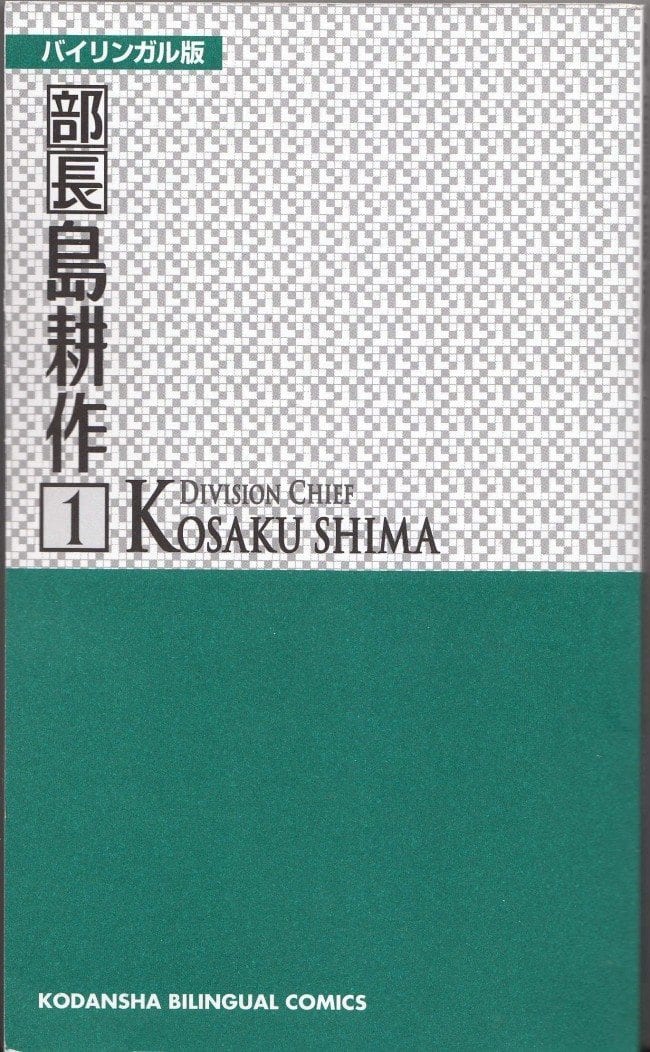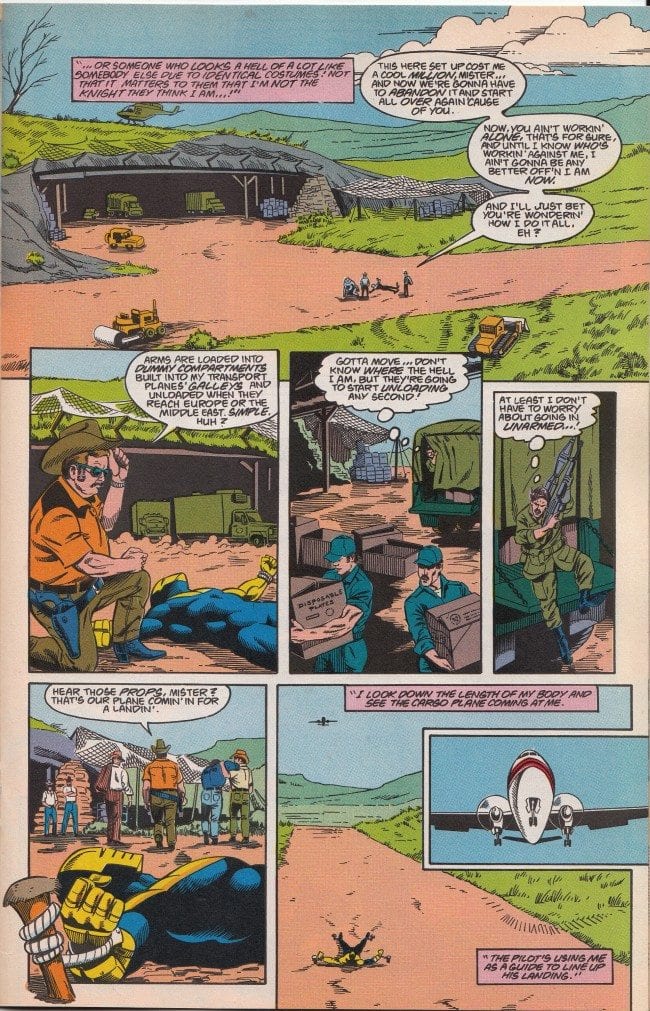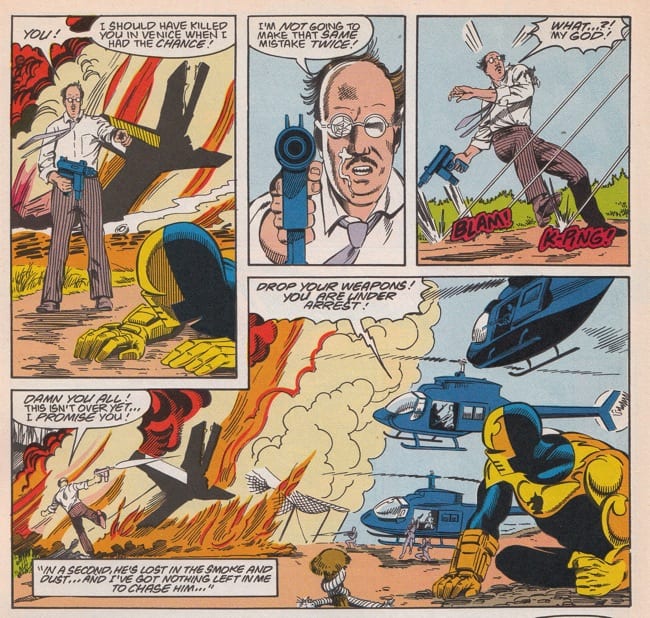Division Chief Kosaku Shima Volume 1
By Kenshi Hirokane
Published by Kodansha Bilingual Comics, 2000
 Readers of this website's Joe McCulloch might recognize this one, the strangely compelling study of a man who goes to work, forever. "Strangely" doesn't quite fit the comic in its native land, where the story of Kosaku Shima's career is of such widespread popularity that the character's eventual promotion was reported upon as if it were a real-world development in corporate coronation. (An eventual full-page article published in that bastion of comics criticism, The Economist, soberly proposing that Japan would do well to copy the managerial style of this fictional hero served as my own introduction to the character.) Alas, an English translation of the little Division Chief who could (and does, always better) continues to escape those of us who hunger for him, the only exception being, well, this: a format routinely described as being for the people its fictional word so lovingly portrays. A businessman's manga in bilingual publication, for the traveler who'd like to catch himself up before he touches down in Japan. Or the U.S.? It could go either way. The story is tiny--166 pages just isn't enough when the focus is on a man who thinks the company should recycle its products packaging materials and the multiple pitch meetings he'll attend to calmly convince his superiors that such a costly endeavor is the right move to make. The story winds its way through a few forest of subplot--a superior's illness, a long distance relationship--but it's ultimately just a brief taste, a confirmation that what you've always heard about this comic is absolutely, 100% true: it's about a businessman who works very hard, and that's absolutely it. It doesn't hurt that the comic (and its translator) shows no inclination towards the non-Japanese reader whatsoever--you can watch, but you better keep up--resulting in a reading experience that's refreshingly free of the American tendency towards thanking the reader for merely touching the page. Is it an argument for Japanese business practice as being superior? It's possible, but it feels like that description sells its ambitions short--this isn't a comic about what the Japanese worker is like, it's about what the Japanese worker should strive to be like. It's the light itself--the lighthouse is just where it chooses to visit.
Readers of this website's Joe McCulloch might recognize this one, the strangely compelling study of a man who goes to work, forever. "Strangely" doesn't quite fit the comic in its native land, where the story of Kosaku Shima's career is of such widespread popularity that the character's eventual promotion was reported upon as if it were a real-world development in corporate coronation. (An eventual full-page article published in that bastion of comics criticism, The Economist, soberly proposing that Japan would do well to copy the managerial style of this fictional hero served as my own introduction to the character.) Alas, an English translation of the little Division Chief who could (and does, always better) continues to escape those of us who hunger for him, the only exception being, well, this: a format routinely described as being for the people its fictional word so lovingly portrays. A businessman's manga in bilingual publication, for the traveler who'd like to catch himself up before he touches down in Japan. Or the U.S.? It could go either way. The story is tiny--166 pages just isn't enough when the focus is on a man who thinks the company should recycle its products packaging materials and the multiple pitch meetings he'll attend to calmly convince his superiors that such a costly endeavor is the right move to make. The story winds its way through a few forest of subplot--a superior's illness, a long distance relationship--but it's ultimately just a brief taste, a confirmation that what you've always heard about this comic is absolutely, 100% true: it's about a businessman who works very hard, and that's absolutely it. It doesn't hurt that the comic (and its translator) shows no inclination towards the non-Japanese reader whatsoever--you can watch, but you better keep up--resulting in a reading experience that's refreshingly free of the American tendency towards thanking the reader for merely touching the page. Is it an argument for Japanese business practice as being superior? It's possible, but it feels like that description sells its ambitions short--this isn't a comic about what the Japanese worker is like, it's about what the Japanese worker should strive to be like. It's the light itself--the lighthouse is just where it chooses to visit.
Sinner Volume 1, Number 4
By José Muñoz & Carlos Sampayo
Published by Fantagaphics, 1989
 A long, involving story about a white man who ends up knee deep in the problems of black men in Harlem, the opening pages of "Viet Blues" feel very, very familiar: it's the same opening you find in too many stories about a burned-out white dude discovering his conscience amongst the brown people who live north of Lincoln Center. It's easy to hear that pro-defense argument rising up, the "well you've got to remember that Munoz and Sampayo were heavily influenced by pulp in these stories and they aren't privileged Americans anyway" sort of phrase except--except it turns out to be unnecessary, as the story isn't about what you'd thought it was anyway. This isn't a story about a white guy solving anything, he doesn't even take the time to sober all the way up for half the page count, and the survival and success that the conclusion brings isn't one which he has any agency for--he's essentially a pre-X-Files David Duchnovy, pawing through other people's tawdries, suckling up whatever juicy bits they're willing to pass on, being tolerated because he has a well behaved dog. It doesn't mean "Viet Blues" isn't predictable at times--of course the innocent hitchhiker is gonna get murdered, of course we haven't seen the last of the monster in the pinstripe suit, and yes, if the room has blinds, a monologue is coming.
A long, involving story about a white man who ends up knee deep in the problems of black men in Harlem, the opening pages of "Viet Blues" feel very, very familiar: it's the same opening you find in too many stories about a burned-out white dude discovering his conscience amongst the brown people who live north of Lincoln Center. It's easy to hear that pro-defense argument rising up, the "well you've got to remember that Munoz and Sampayo were heavily influenced by pulp in these stories and they aren't privileged Americans anyway" sort of phrase except--except it turns out to be unnecessary, as the story isn't about what you'd thought it was anyway. This isn't a story about a white guy solving anything, he doesn't even take the time to sober all the way up for half the page count, and the survival and success that the conclusion brings isn't one which he has any agency for--he's essentially a pre-X-Files David Duchnovy, pawing through other people's tawdries, suckling up whatever juicy bits they're willing to pass on, being tolerated because he has a well behaved dog. It doesn't mean "Viet Blues" isn't predictable at times--of course the innocent hitchhiker is gonna get murdered, of course we haven't seen the last of the monster in the pinstripe suit, and yes, if the room has blinds, a monologue is coming.
 It's the art that should be the main draw, and while it is, there's such a keen sense of loss around these gremlins and ghosts. The impact has been sapped by the legion of imitators and other well-meaning thieves. Frank Miller's Sin City and Sinner are at this point so entwined in a certain way that it's difficult for the shadow of Marv and perversion--and all that cornball dialog!--not to be felt over Sinner's pages. At the time, it probably seemed like Keith Giffen's famous thievery would be the ugly footnote, but now his stupidity (foolishness?) seems almost quaint alongside the Miller effect. If there was more--and there is more, a lot more, it's just beyond the reach of the monolingual hordes--it might be a different story. Instead it's this, a brief passage to the world that should've been.
It's the art that should be the main draw, and while it is, there's such a keen sense of loss around these gremlins and ghosts. The impact has been sapped by the legion of imitators and other well-meaning thieves. Frank Miller's Sin City and Sinner are at this point so entwined in a certain way that it's difficult for the shadow of Marv and perversion--and all that cornball dialog!--not to be felt over Sinner's pages. At the time, it probably seemed like Keith Giffen's famous thievery would be the ugly footnote, but now his stupidity (foolishness?) seems almost quaint alongside the Miller effect. If there was more--and there is more, a lot more, it's just beyond the reach of the monolingual hordes--it might be a different story. Instead it's this, a brief passage to the world that should've been.
Checkmate! #5
By Paul Kupperberg, Steve Erwin, Al Vey, Julianna Ferriter
Published by DC Comics, 1988
 Checkmate! was an '80s comic set in the DC universe that centered around a semi-secret spy organization set up under an almost medieval hierarchy, with its various bodies of power structured into the differing categories of chessboard pieces--kings, queens, pawns, etc. The coolest were the knights, characters of varying identity dressed in bright yellow and blue outfits that could only work in superhero comics, and even then, only because the kind of humor on tap was always a fat guy spilling food on his clothes. "Laugh at this," Steve Erwin's art officiously proclaims, "Everything else is important." (In Checkmate!, the fat guy was played by Harvey Bullock, on loan from Batman comics.) Checkmate! comics usually focused on '80s concerns--terrorists, drug tycoons, guys who wear aviator sunglasses--and the heroes usually focused on defeating them while ladling out the self-disgust of someone who has to do a job for someone they don't particularly like or respect. It was a comic for people who would rather not vote for Republicans or Democrats, even though they know in the end they'll go for whichever guy at least doesn't say horrible things about imaginary welfare moms. Checkmate!, if we're being honest, was for teenagers who take themselves way too seriously. But it was also the kind of comic where, every once in a while, one of the characters would say something along the lines of "But unlike the sergeant, my hands aren't tied by rules and regulations about where I got and how I obtain evidence..."
Checkmate! was an '80s comic set in the DC universe that centered around a semi-secret spy organization set up under an almost medieval hierarchy, with its various bodies of power structured into the differing categories of chessboard pieces--kings, queens, pawns, etc. The coolest were the knights, characters of varying identity dressed in bright yellow and blue outfits that could only work in superhero comics, and even then, only because the kind of humor on tap was always a fat guy spilling food on his clothes. "Laugh at this," Steve Erwin's art officiously proclaims, "Everything else is important." (In Checkmate!, the fat guy was played by Harvey Bullock, on loan from Batman comics.) Checkmate! comics usually focused on '80s concerns--terrorists, drug tycoons, guys who wear aviator sunglasses--and the heroes usually focused on defeating them while ladling out the self-disgust of someone who has to do a job for someone they don't particularly like or respect. It was a comic for people who would rather not vote for Republicans or Democrats, even though they know in the end they'll go for whichever guy at least doesn't say horrible things about imaginary welfare moms. Checkmate!, if we're being honest, was for teenagers who take themselves way too seriously. But it was also the kind of comic where, every once in a while, one of the characters would say something along the lines of "But unlike the sergeant, my hands aren't tied by rules and regulations about where I got and how I obtain evidence..."
 "M.T. Cavanaugh" is a wonderful name for a bad guy. It's the kind of role you can see J.T. Walsh slip into like a wetsuit. Isn't it lovely how that one henchman is sitting down on the tree stump? Listening to old M.T. spin a yarn about murder and empire building? If I wasn't about to tell you that he's the type of blowhard so convinced of his own potency that he'll freely explain the entirety of his nefarious plans the second he's convinced he's won--even if he hasn't figured out who it is he's talking to, or checked to see if that costumed stranger might have an eight-inch knife attached to a spring--you'd probably have guessed it just by drinking in that mustache.
"M.T. Cavanaugh" is a wonderful name for a bad guy. It's the kind of role you can see J.T. Walsh slip into like a wetsuit. Isn't it lovely how that one henchman is sitting down on the tree stump? Listening to old M.T. spin a yarn about murder and empire building? If I wasn't about to tell you that he's the type of blowhard so convinced of his own potency that he'll freely explain the entirety of his nefarious plans the second he's convinced he's won--even if he hasn't figured out who it is he's talking to, or checked to see if that costumed stranger might have an eight-inch knife attached to a spring--you'd probably have guessed it just by drinking in that mustache.
 An orange, short-sleeved cowboy shirt with bolo tie and brown pants? This guy really is the best. And while you'll have to take my word for it, there's a yellow and white dreamcatcher--those things small children make at summer camp--stuck to the front of what is certainly a ten-gallon hat. Was there an M.T. Cavanaugh Jr? Is that his handiwork? (And can we thank him for that panel-breaking stake as well? I'm gonna!)
An orange, short-sleeved cowboy shirt with bolo tie and brown pants? This guy really is the best. And while you'll have to take my word for it, there's a yellow and white dreamcatcher--those things small children make at summer camp--stuck to the front of what is certainly a ten-gallon hat. Was there an M.T. Cavanaugh Jr? Is that his handiwork? (And can we thank him for that panel-breaking stake as well? I'm gonna!)
 There's a lot to like about this sort of comic when you put it on a grid and start checking off boxes--it's heavily organized stuff, a comic that treats the DC universe it inhabited as if that was a place that makes logical sense, a place where real people might live, and hope, and dream. Somebody has to repair these cities and keep these people alive long enough so that Darkseid or Amazo or some Crisis can come along and kill a bunch of them, right? Why can't it be a guy who takes his ungrateful and belligerent children to work for a visit, only for them to remain unimpressed by the gigantic spy organization out of which he deals in the accounting of death, the bureaucracy of counter-terrorism?
There's a lot to like about this sort of comic when you put it on a grid and start checking off boxes--it's heavily organized stuff, a comic that treats the DC universe it inhabited as if that was a place that makes logical sense, a place where real people might live, and hope, and dream. Somebody has to repair these cities and keep these people alive long enough so that Darkseid or Amazo or some Crisis can come along and kill a bunch of them, right? Why can't it be a guy who takes his ungrateful and belligerent children to work for a visit, only for them to remain unimpressed by the gigantic spy organization out of which he deals in the accounting of death, the bureaucracy of counter-terrorism?
 Alas, it doesn't really work. It's charming, certainly, and it goes without saying that it's far more competent and easy to read than a lot of what one finds from this company's current product. But like every other superhero comic that pulls the "let's talk about real people, let's talk about their concerns" card, Checkmate! is ultimately outclassed by the most meager of television's fare. None of these people are believable, the villain's multitude of traits makes him the only one that's compelling, and it's impossible to gather what the point of it is. Entertainment has jokes, or drama, or thrills--it brings something to the table, it doesn't just ruminate on the idea that tables exist, demanding gratitude and reverence for the most meager of named attributes. Charm's a five-minute trait, and Checkmate--well, it isn't marriage material.
Alas, it doesn't really work. It's charming, certainly, and it goes without saying that it's far more competent and easy to read than a lot of what one finds from this company's current product. But like every other superhero comic that pulls the "let's talk about real people, let's talk about their concerns" card, Checkmate! is ultimately outclassed by the most meager of television's fare. None of these people are believable, the villain's multitude of traits makes him the only one that's compelling, and it's impossible to gather what the point of it is. Entertainment has jokes, or drama, or thrills--it brings something to the table, it doesn't just ruminate on the idea that tables exist, demanding gratitude and reverence for the most meager of named attributes. Charm's a five-minute trait, and Checkmate--well, it isn't marriage material.






